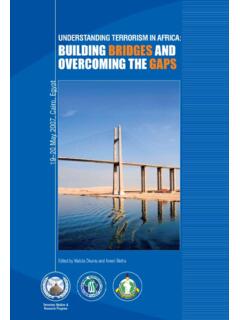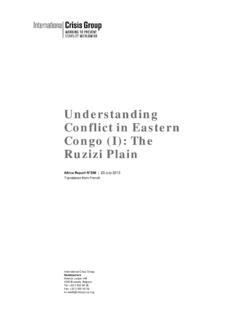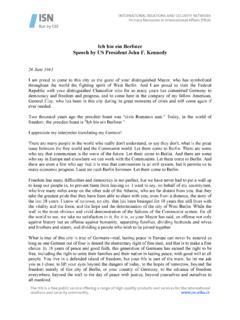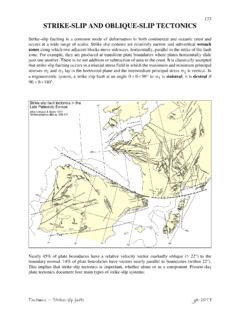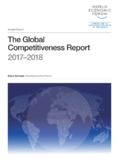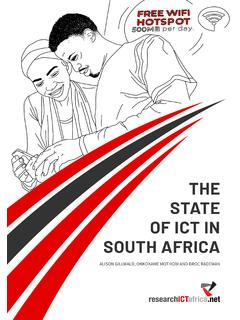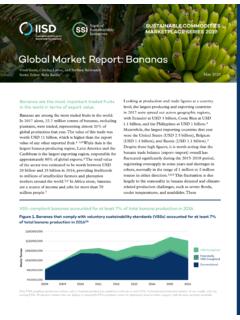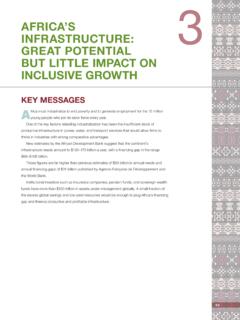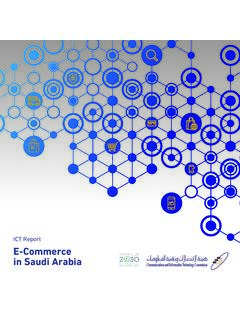Transcription of The Challenges of Regional Integration in Africa: In the ...
1 The Challenges of Regional Integration in africa In the context of globalisation and the prospects for a United States of africa Mzukisi Qobo ISS Paper 145 June 2007. Price: Introduction be regarded as an important achievement towards this strategic objective. While the previous plans It is widely acknowledged that africa 's Integration placed a premium on intra- Regional trade, agriculture, efforts have thus far failed to bear satisfactory fruit. technology and the environment, it would seem as While other regions have successfully used their if the new initiatives are emphasising ownership, Integration mechanisms to improve their economic economic reform and political modernisation. It is welfare, africa lags behind with respect to GDP unclear if and when the fruits of the latest initiatives growth, per capita income, capital inflows, and will begin to manifest.
2 General living standards. This is a problem across most of the continent, in spite of the existence of a The question is: In view of the fact that the plans plethora of policy plans and grand visions. that were articulated by the first generation of post- colonial leaders failed to materialise, what gives The first major blueprint for africa 's force to the new-found optimism that development the Lagos Plan of Action characterises today's proponents of and the Final Act of Lagos was adopted almost three decades ago, The old model of africa 's Integration ? Could there have been something fundamentally wrong and set out a vision of an integrated regionalism, cast with the initial casting of this vision African market by the year 2000. on the ideological that today's elite can successfully It was given further impetus by the rectify, so that africa can be set on Abuja Treaty which was approved in paradigm of Pan- a promising developmental trajectory?
3 1991 and came into force in 1994. Africanism .. is The contention in this paper is that According to this Treaty, the African too little has changed since the 1980s Economic Community (AEC) would be incompatible with to advance Regional Integration and to in place by 2028. Some of its milestones the new Challenges ensure developmental progress on the would include strengthening of existing continent. Regional economic communities of globalisation and the formation of the new ones It would seem that africa 's elites are (between 1994 and 1999); stabilisation focusing on the wrong set of priorities of existing tariffs, and Integration and harmonisation with too little genuine commitment towards the goal of economic sectors (1999 to 2007); establishment of africa 's development. For Regional Integration in of a free trade area and customs union (2007 to africa to be a success, africa 's leaders will have to 2017 ); harmonisation of tariff systems across various move beyond grand gestures and abstract visions.
4 Regional economic communities (RECs) ( 2017 to africa 's Challenges call for pragmatism and a sense 2019); the creation of a common African market of urgency in action. More focused and gradual steps and harmonisation of monetary, financial, and fiscal that are carefully executed at the domestic level may policies; and the establishment of a pan-African be the best place to start. economic and monetary union (2023 to 2028). The focus of such steps at the domestic level should This plan envisaged that, through RECs, deep- be on bold and sustainable political and economic seated Challenges of poverty and underdevelopment reforms. At the Regional level the focus should would be eradicated. Among the latest initiatives be on developmental coordination and gradual has been the New Economic Partnership for africa 's harmonisation of policies and regulations, which could Development (NEPAD), as well as the vision for the form the foundation for greater Integration .
5 As Percy United States of africa '. The establishment of the Mistry contends: African governments need to be Pan-African Parliament (PAP) in March 2004 can less ambitious and more realistic and pragmatic about The Challenges of Regional Integration in africa page 1 Paper 145 June 2007. the objectives and intermediate targets for Integration , Preferential Trade Agreement for East and Southern taking into account the constraints and capacities of africa (later the Common Market for East and Southern integrating national governments' (Mistry 2000:566) African States Comesa) were inspired by this pan- The core of this paper is a discussion in greater detail Africanist vision. There are other initiatives that on what this would entail. evolved outside this framework, such as the Southern African Customs Union (SACU), the Southern African In the paper the theme of Regional economic Development and Coordinating Conference (and later Integration within the AU's notion of building a the Southern African Development Community), and United States of africa is explored.
6 The validity the East African Community (EAC). of the proposition that political Integration is a desirable strategy for overcoming africa 's deep-seated While colonialism did play a role in africa 's lack of developmental Challenges is critically assessed. The development, the policies adopted by postcolonial old model of regionalism, cast on the ideological leaders as well as their practices in power, denied paradigm of Pan-Africanism with its primary focus on africa any room for growth and development. politics rather than economics, is incompatible with Consider, for example, that the growth path of the new Challenges of globalisation. Lastly prospects the post-colonial elite mostly took the form of for africa 's economic progress, focusing on trade import-substitution industrialisation.
7 Predicated on reform under the current political arrangement and in substituting domestically produced products for the context of globalisation, is assessed. foreign imports and for preserving foreign exchange, this growth strategy constrained the full development africa 's Regional Integration in of productive forces in most parts of the continent. It historical perspective produced inefficient and uncompetitive economies, with stunted private sectors. After independence Regional Integration became a pillar of africa 's developmental Such an approach would not help to strategy. Pan-Africanism, an ideology It would seem overcome the intractable Challenges which emphasises continental unity that africa 's elites of rural poverty; the small size of and strong identification with ongoing are focusing on the economies; the lack of product anti-colonial struggles, was the leitmotif complementarities as manifested in the of africa 's developmental framework.
8 The wrong set of narrow set of similar commodities; the This perspective sought to externalise priorities with low value of primary export products africa 's problems, with much of the and basic minerals; and the dependence blame laid at the door of former colonial too little genuine on imports for intermediate and finished powers, with little responsibility and commitment goods. As Ndulu and O'Connell accountability demanded of the post- (1999:63) observe: In choosing state- colonial African elite. Politically this was towards the led and inward-looking industrialisation, the safest position to be in as economic goal of africa 's africa 's first generation of leaders were failures could always be ascribed to the development captive to ideas rather than interests.'. legacy of imperialism and colonialism.
9 As Mistry (2000:554) points out, africa 's The foregoing reality has to be viewed commitment to Integration appears to have been within the context of africa 's positioning in the visceral rather than rational, more rhetorical than real.' international division of labour, in which the continent is export dependent on oil and non-oil commodities From the beginning of the decolonisation process and is import dependent on manufactured goods in the 1960s, the establishment of sub- Regional largely from Europe, and is adversely affected by economic communities was a significant part of fluctuating terms of trade. Although there has been africa 's development strategy. Regionalism in africa a gradual shift by some countries towards exports began during this period, spearheaded in large of processed goods and manufactured items, there measure by the Organisation of African Unity (OAU) are serious supply-side constraints and lack of and Economic Commission on africa (ECA), partly competitiveness in most of the economies on the as a response to the last vestiges of colonialism as continent.
10 Well as to spur political and economic progress on the continent; and partly as a political instrument to Indeed, africa 's Challenges are a combination of deal with the power imbalances in the international external and internal factors. In this paper the system. It is worth pointing out that at independence emphasis is on the latter. Much has been made of africa lacked the human and physical capital that is the unequal relationship between Europe and africa , required for industrialisation. and the adverse effects of the unfavourable external environment on the continent, with little responsibility Initiatives such as the Economic Community of Central apportioned to africa 's leaders. As is pointed on in the African States, the Arab Maghreb Union, and the UNCTAD report , even under a favourable external The Challenges of Regional Integration in africa page 2 Paper 145 June 2007.
